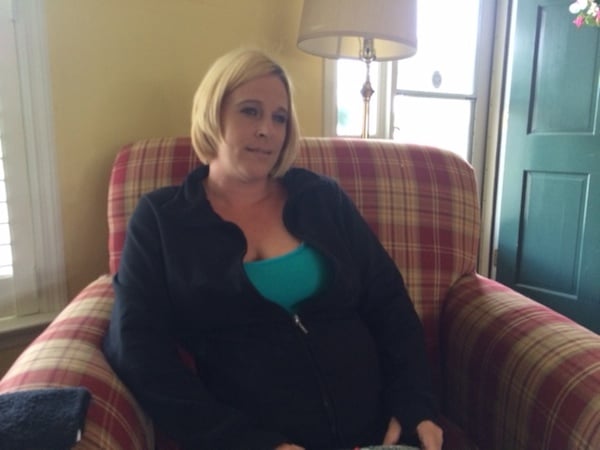While incarcerated women have characteristics that are similar to their male counterparts, a closer look reveals another story. Studies have shown that the majority of incarcerated women were victims of verbal, physical or sexual abuse before coming to prison. A recent investigation by the U.S. Department of Justice revealed cases of sexual abuse by guards at Alabama’s Julia Tutwiler Prison for Women.
Stephanie Hibbett washes the dishes in her small kitchen. She’s content now, living a quiet life in rural Flintstone, Georgia, homeschooling her teenage daughter. But times weren’t always as peaceful.
“I was married to a jerk, I guess you can say. He was abusive. Very,” explains Hibbett.
While she was happy with her decision to divorce him, other bad decisions complicated her life.
She was sent to a county jail for being found in possession of forged documents. While there, she heard that her troubled teenage son had attempted suicide. She escaped work release to visit him in the hospital. That serious infraction landed her in Julia Tutwiler prison.
Once there, she says she fell victim to physical abuse. Hibbett says a male guard came up to her and started making sexual advances, “Touching me in places I didn’t want to be touched,” she says.
Hibbett says another time the guard approached her and kissed her.
According to clinical psychologist Dr. Larry Wood, physical and emotional abuse like what Hibbett experienced can be devastating to women inmates, especially if they have a history of abuse prior to be being incarcerated.
Wood is a 20 year veteran with the Federal Bureau of Prisons and has spent time counseling inmates at Tutwiler. He notes every female he counseled there said they had been physically or sexually abused prior to incarceration. He says when women encounter verbal, physical or sexual abuse in prison, they are re-traumatized.
“They don’t have a well-developed or mature identity, Wood explains. “They think of themselves as incompetent and inept and then when they go to prison, they’re told that repeatedly. You’re worthless, you’re the scum of the earth, in those words. That kind of environment just reinforces it.”
After the incident, Hibbett reported it to prison authorities. She was asked to take a lie detector test, which she passed. She was eventually released and reported the incident to the Equal Justice Initiative, a non-profit organization. They reported this incident, as well as others, to the Justice Department, which ignited their investigation.
Prior abuse is often a major contributing factor to incarceration for some women. Brenda Smith is a professor at American University, Washington College of Law who has studied the cycle of abuse incarcerated women can experience. She agrees that abuse in prisons re-traumatizes women.
“Past histories of physical and sexual abuse can lead to depression, it can be accompanied by alcohol and drug abuse,” she says. “And, the reality is that sometimes that alcohol use and that drug use can also be the very thing that gets you incarcerated.”
Smith explains if a woman has a history of abuse, it can make her react abnormally to guards when they make demands.
Melissa McNeal has seen this, too. She is with the Alabama Appleseed Center for Law and Justice. She says inmates may perceive certain non-threatening interactions with guards as abuse, and sometimes they overreact.
“A person can just say, ‘hey you guys need to go down this hall,'” McNeal notes, “And six of them will continue walking and do what they’re told, and one is thinking, ‘wait a minute, that sounds like the way my father used to talk to me before…’ and now you have an issue with one inmate who you think is just disrespectful.”
If a female prisoner is caught up in a cycle of abuse, does she have much of a chance to overcome it after her release? Larry Wood says maybe.
“They come to prison and everything is taken away from them,” Wood explains. “They had nothing to build on. The prospect for that person recovering and becoming a functional person in society is remote. And, at best, they’ll have psychological problems all of their lives.”
Those problems that can lead them back to prison.
But there is hope. Wood says offering female inmates mental health counseling is helpful. He also points to the job and life skills classes taught at Tutwiler as being particularly useful. He says both can help women escape the cycle of abuse as well as help lower rates of recidivism.

